
International Intellectual Property in an Integrated World Economy, Fifth Edition
by Frederick M. Abbott, Thomas Cottier, Francis Gurry, Ryan B. Abbott, Mira Burri, Henning Grosse Ruse-Khan, Maegan McCann
International Intellectual Property in an Integrated World Economy features a comprehensive introduction to the global system regulating the field of intellectual property rights, including how the treatment of IP may affect a broad range of social and political interests.
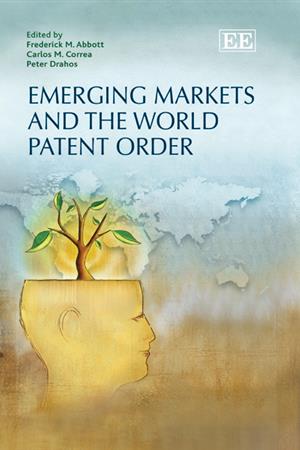
Emerging Markets and the World Patent Order
Edited by Frederick M. Abbott, Edward Ball Eminent Scholar Professor of International Law, Florida State University College of Law, US, Carlos M. Correa, Professor and Director, Centre for Interdisciplinary Studies on Industrial Property and Economics (CEIDIE), Law Faculty,University of Buenos Aires, Argentina andPeter Drahos, Professor, Regulatory Institutions Network, The Australian National University and Chair in Intellectual Property, Queen Mary,University of London, UK.
The patent has emerged as a dominant force in 21st century economic policy. This book examines the impact of the BRICS and other emerging economies on the global patent framework and charts the phenomenal rise in the number of patents in some of these countries.Contributors include: F.M. Abbott, D. Borges Barbosa, C.M. Correa, P. Drahos, M. El Said, C. Fink, P. Gehl Sampath, K. Karachalios,R. Kher, J. Kuanpoth, A. Kudlinski, T. Payosova, P. Roffe, S.K. Sell, Y. Tamura, G. Van Overwalle, Y.A. Vawda, H. Zhang, W. Zhuang.
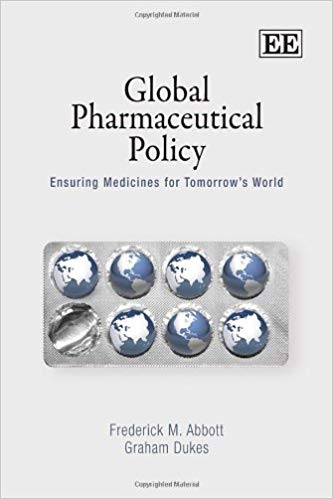
Global Pharmaceutical Policy
by Frederick M. Abbott (Author), Graham Dukes (Author)
Contents Preface1.The Challenges we Face 2. Promoting Innovation: Patents, Subsidies, Prizes and Prices 3. Policies on Innovation: Past, Present and Future 4. The Global Regulatory Environment: Quality, Safety and Efficacy 5. Medicines for the Developing World 6. The Use of Medicines: Education, Information and Persuasion 7. Regulation and the Role of the Courts 8. Specialized Policy Areas: Vaccines, Biologicals and Blood Products; Alternative and Traditional Medicines; Self-Medication; Counterfeit Medicines 9. The Rich, the Poor and the Neglected 10. Global and Regional Policies: The Way Ahead Index
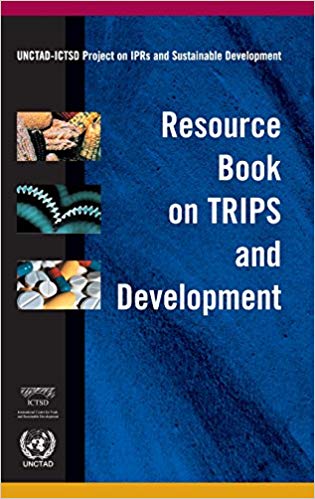
Resource Book on TRIPS and Development
Frederick M. Abbott and Carlos Correa, Principal Consultants
"Frederick Abbott (Edward Ball Eminent Scholar Professor, Florida State University College of Law) and Carlos M. Correa (Professor, Director of the Masters Programme on Science and Technology Policy and Management, University of Buenos Aires) are the principal consultants and overall advisers of this work."
"This is conceived as a guide that will provide background and technical information on the main issues under discussion in TRIPS. It should be a practical tool for negotiators and policymakers in order to facilitate their informed participation in negotiations and decision-making processes."
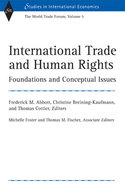
International Trade and Human Rights
Eds. Frederick M. Abbott, Christine Breining-Kaufman, Thomas Cottier
International Trade and Human Rights
Foundations and Conceptual Issues (World Trade Forum, Volume 5)(2005)
Frederick M. Abbott, Christine Breining-Kaufmann and Thomas Cottier,
Editors
Michelle Foster and Thomas Fischer, Associate Editors
The World Trade Forum 2001 on Trade and Human Rights addressed the most controversial issues
in the debate on globalization
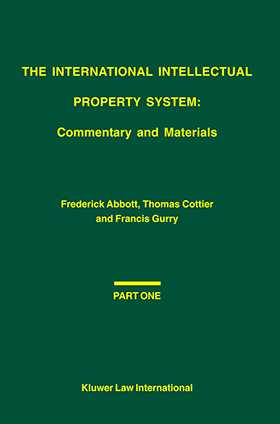
The International Intellectual Property System: Commentary and Materials
Frederick Abbott, Thomas Cottier & Francis Gurry
The 1990s will be remembered as an era of prodigious expansion in world trade. Suddenly—for reasons encompassing irresistible new on-line technology,a vastly greater geographic reach, and sheer volume of goods and services—the old intellectual property (IP) laws and protocols long respected by international business became woefully inadequate.

China in the World Trading System
Defining the Principles of Engagement
China's constructive integration into the world trade & economic system is of the utmost importance to the people of Asia, to the United States & other OECD countries, & to the international community as a whole.
The Chinese economy of decades past; under the rigid domination of state planners & isolated from the outside world; is substantially transforming to market orientation & openness to trade. The future path of the Chinese economy, now the second largest in the world, will strongly influence the path of economic development in the Asia-Pacific region, & with it the path of the world trading system. This book brings together leading international trade law & economics experts, government officials responsible for the formulation & implementation of trade policy with China,& business executives at firms with significant interests in China, to consider the future of trade policy for & with China.
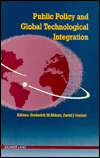
Public Policy and Global Technological Integration
F.M. Abbott & D. J. Gerber eds., Kluwer Law International (1997)
New technologies are developing at a tremendous pace. They transform global political, economic, and social relations in ways that often present unique challenges to public policymakers who must plan for the future in a landscape subject to the constant changes of global technological integration.
The World Trade Organization (WTO) faces these challenges in the context of regulating world trade, particularly in implementing the agreement on trade-related aspects of intellectual property rights (TRIPS). The World Intellectual Property Organization (WIPO) must adapt to the challenges in regulating intellectual property rights and in promoting the development of technological infrastructure.
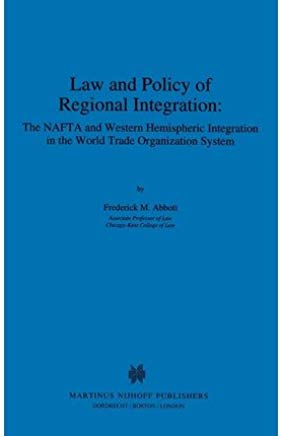
LAW AND POLICY OF REGIONAL INTEGRATION: THE NAFTA AND WESTERN HEMISPHERIC INTEGRATION & IN THE WORLD TRADE ORGANIZATION SYSTEM (1995)
By Frederick M. Abbott
The publication of Frederick Abbott's new book could not be more timely. The impact of the NAFTA on the North Americanmarketplace has clearly manifested itself over the past year and the emergence of the World Trade Organization (WTO)as the regulator of global commerce will have a profound influence on the conduct of international trade.
This book provides a comprehensive approach to the study of the NAFTA and its implications for the global trading system. It covers the political and legal process of NAFTA approval as well as the NAFTA's potential economic impact.
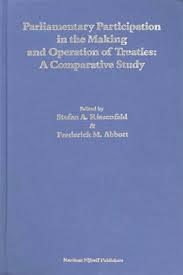
Awarded the 1995 American Society of International Law "Certificate of Merit for High Technical Craftsmanship"
Edited by Stefan A. Riesenfeld and Frederick M. Abbott
This book represents the culmination of a project initiated in 1990 which brought together a distinguished group of judges, scholars and government officials to address the role of parliaments in the making and implementation of international treaty law.
Treaties are increasingly employed to define the rights and obligations of individuals in the field of human rights, to regulate the participation of persons (both individual and corporate) across the broad spectrum of economic activity within and across national boundaries, as well as to control human activity as it impacts on the environment. These are matters which historically were largely within the regulatory competence of national authorities, but now are increasingly the subject of international legislation. But the role of the parliament with respect to the making of international legislation has remained substantially confined within a customary historical model.
For the past several centuries, the national executive has played the principal role in the initiation, negotiation, conclusion and operation of treaties. The parliament's role has been secondary, being largely confined to the approval or rejection of engagements proposed by the executive. Over the past decades there has been a movement in a number of countries toward a more active role for parliament, particularly with respect to demands to provide guidance to the executive. Nevertheless, while the historical distribution of treaty powers may remain appropriate in traditional areas of executive prerogative (for example, in the realm of political relations and national security), one must question the extent to which increased parliamentary participation is adequate in relation to the making of international law by treaty, particularly when the treaty is an instrument with national legislative effects.
This volume is an important and timely resource for those who wish to pursue the question of the actual or desirable role of parliaments in the making and operation of treaties.









